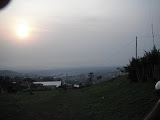I was sitting in the backseat of the Kumbo West District Medical Officer, Dr. Yota’s truck a couple of weeks ago listening to the conversation with his driver. We were on our way to the health center in Kitikaium for a focus group discussion when we passed a signboard for the Government Bilingual High School. “Ay-yah, these people are having a bilingual school? Are they getting French teachers?” Dr. Yota asked. “No, the teachers have not yet come,” the driver responded. It was at that moment that I realized how often I hear the phrase, not yet. The women for the focus group have not yet come, the electricity has not yet come back, the internet is not yet working, the taxi is not yet full of people, the food is not yet ready. As I stop to think about it, the words “not yet” imply a waiting in expectation, hopefulness. After hearing so many stories about the poorly functioning education system and the rift between the Anglophones and Francophones, I realized that if I was asked about the likelihood of a Francophone teacher coming to teach at a small village in the Northwest Region my answer would not be as hopeful as the driver’s. I wonder, does growing up in a country where not yet is part of daily life make Cameroonians inherently more patient people?
 |
| My mom took this picture in Cameroon last June. Many taxi bumpers have similar hopeful sayings. We both smiled when we walked past this man as we realized he was certainly being very patient. |
I know that while I am here I am forced to become a more patient person as I often have no other choice but to wait for the women to come, the taxi to fill, the electricity to come back, the internet to work, the food to be prepared. Usually I do not mind waiting except when I get very hungry or have to use the toilet. Regarding the latter, I try to hold out as long as I can, but when things get desperate and have to ask someone where the toilet is, I usually get the question, “Do you want to piss or shit?” as this determines which latrine I can use. I am still practicing the art of answering questions about my bodily functions in public.
On a deeper level, I have been pondering what does not yet mean for me spiritually. The Princeton Theologian Gerhard Vos taught that the Kingdom of God is “already, but not yet here” This means that we see glimpses of the Kingdom of God around us through miracles and gifts of the Holy Spirit, but we also still have poverty, war, sickness, and death because the Kingdom of God has not yet fully come. However, unlike simply waiting for the women to come or the taxi to fill with an acceptance that there is nothing else to do but wait, I can co-work with the Holy Spirit to bring forth the Kingdom. So now the question for me is how do I bring forth the Kingdom in my work here? After conducting multiple key informant interviews and focus group discussions, it appears that my outcome variable for my research will change. Originally, it was going to be intention for women to exclusively breastfeed. However, based on our interviews and discussions it appears that almost all of the women have the intention to exclusively breastfeed for six months and we would not see much change because of our intervention. I certainly have seen glimpses of God at work through and around me, but we have not yet found an alternative outcome variable. This week we will begin analyzing all of our qualitative data and I am hopeful that we will find another way to further the Kingdom of God in this place.
Waiting patiently in expectation is the foundation of the spiritual life
Simone Weil














